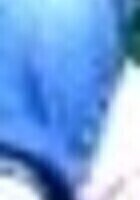All Intermediate Geometry Resources
Example Questions
Example Question #1913 : High School Math
A cube has edges that are three times as long as those of a smaller cube. The volume of the bigger cube is how many times larger than that of the smaller cube?
If we let 

The larger cube has edges three times as long, so the length can be represented as 


The large cube's volume of 

Example Question #1 : How To Find The Volume Of A Cube
The side length of a cube is 
What is the volume?
The volume of a cube is
So with a side length of 7 inches, the volume is
Example Question #1 : How To Find The Volume Of A Cube
The side length of a cube is 
What is the volume?
The volume of a cube is
So with a side length of 2 ft, the volume is
Example Question #4 : How To Find The Volume Of A Cube
Find the volume of a cube with an edge length of 
The volume of a cube can be determined through the equation 



Example Question #1 : How To Find The Volume Of A Cube
If the side of a cube is 
To find the volume of a cube we just multiply a length of one of the cube's sides by itself three times, or in other words, cube it. If we call the length of a side of a cube 
The side of our cube is 
Example Question #1 : How To Find The Volume Of A Cube
A Rubik's Cube is made up of three square layers, with nine identical smaller cubes in each layer. If one of the smaller cubes has side lenghts of 1.5 cm, what is the approximate volume of a whole Rubik's Cube?
This is a great problem becaue ther are two ways to approach it. The simplest way is to realize that because each edge of the Rubik's Cube is made up of 3 of the smaller cubes we can find the edge length for the whole Rubik's Cube:

Now that we know the edge length finding the volume is easy, we simply multiply the length, width, and height of the cube to find the volume. This is easy because the length, width, and height are all 4.5 cm.

This is the answer. Another way to approach the problem would be by finding the volume of one of the smaller cubes, then multiplying by 9 to find the volume of one layer, then multiplying by three, because there are 3 layers.



Two different methods and we got the same answer!
Example Question #3 : How To Find The Volume Of A Cube
A cylinder is cut out of a cube as shown by the figure below.

Find the volume of the figure.

In order to find the volume of the figure, we must first find the volumes of the cube and the cylinder.
Recall how to find the volume of a cube.
Plug in the given side length of the cube to find the volume.
Next, recall how to find the volume of a cylinder.
Use the given diameter to find the length of the radius.
Find the volume of the cylinder.
To find the volume of the figure, subtract the volume of the cylinder from the volume of the cube.
Make sure to round to 
Example Question #4 : How To Find The Volume Of A Cube
A cylinder is cut out of a cube as shown by the figure below.

Find the volume of the figure.

In order to find the volume of the figure, we must first find the volumes of the cube and the cylinder.
Recall how to find the volume of a cube.
Plug in the given side length of the cube to find the volume.
Next, recall how to find the volume of a cylinder.
Use the given diameter to find the length of the radius.
Find the volume of the cylinder.
To find the volume of the figure, subtract the volume of the cylinder from the volume of the cube.
Make sure to round to 
Example Question #2 : How To Find The Volume Of A Cube
A cylinder is cut out of a cube as shown by the figure below.

Find the volume of the figure.

In order to find the volume of the figure, we must first find the volumes of the cube and the cylinder.
Recall how to find the volume of a cube.
Plug in the given side length of the cube to find the volume.
Next, recall how to find the volume of a cylinder.
Use the given diameter to find the length of the radius.
Find the volume of the cylinder.
To find the volume of the figure, subtract the volume of the cylinder from the volume of the cube.
Make sure to round to 
Example Question #6 : How To Find The Volume Of A Cube
A cylinder is cut out of a cube as shown by the figure below.

Find the volume of the figure.

In order to find the volume of the figure, we must first find the volumes of the cube and the cylinder.
Recall how to find the volume of a cube.
Plug in the given side length of the cube to find the volume.
Next, recall how to find the volume of a cylinder.
Use the given diameter to find the length of the radius.
Find the volume of the cylinder.
To find the volume of the figure, subtract the volume of the cylinder from the volume of the cube.
Make sure to round to 
Certified Tutor
Certified Tutor
All Intermediate Geometry Resources


















































































